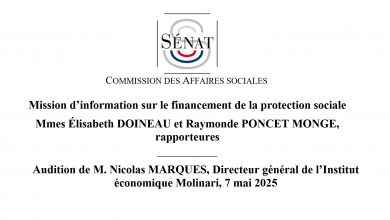Don’t penalise innovation in mobile telecoms
Article published exclusively on the Institut économique Molinari’s website.
Is there not some paradox in seeking to promote something while penalising those who are supposed to be providing it? This is what is happening in France. The government is presenting a highly ambitious plan called « France numérique 2012 » (numérique means digital) that aims, among other things, at developing mobile telecommunications. Meanwhile, the same government plans to hit this sector with a new tax, and public authorities are heavily re-regulating operators.
The telecommunications sector has gone through spectacular innovations. It has enabled consumers to get away from good old landline phones. Innovation should soon make it possible to keep informed, to surf the Web, to check e-mail and to have full access to multimedia content from anywhere in the world.
These innovations require modernising and extending current networks, however. Despite the government’s wishes, more than half of French territory, for example, remains to be covered by a broadband mobile network. In June 2008, only 12% of subscribers had gone over to third-generation (3G) mobile phones, twice as few as in Sweden, Norway or Italy. Improving this situation will inevitably require substantial investments. These risk being delayed by the public authorities’ regulatory appetite and by ill-advised French tax policy.
The mobile operators who will be making these investments are being penalised in several ways.
First, after an opening to competition in the 1990s – not unrelated to the dynamism the telecom sector has experienced since that time – the pendulum is swinging back, and there is a trend toward re-regulating the sector.
Taking a short-term approach, public authorities at both the European and national levels are regulating the marketing and price of service quite strictly. Price ceilings were set by European authorities in 2007 on roaming charges for international calls, and these ceilings are likely to be lowered in the coming years. A similar project aimed at placing ceilings on SMS roaming charges and data transfers is also on the agenda. Agreement was obtained, on 27 November 2008, from Europe’s 27 telecommunications ministers and must be ratified by the European Parliament for final adoption.
Nor have national regulators remained inactive. For example, price reductions were imposed by ARCEP, the French regulator, on call terminations (consisting of each operator conveying calls coming from other operators).
Unlike authentic price declines resulting from innovation and increased competition in the market, these price drops decreed by public authorities occur at the expense of investment in providing the services of tomorrow. For consumers, this will mean relatively higher prices in the future, a smaller choice of offers, or inadequate « new-generation » network capacity.
New obligations have also been established in terms of marketing. The 2008 Chatel law on « the rights of cyber-consumers » limits, for example, the length of contractual commitments and imposes the termination of 24-month contracts without consumers paying the total amounts they owe. Although politically attractive in pleasing some consumers who are fond of changing operators without sticking to their contractual commitments, these obligations impose extra costs on operators.
The list of new regulations that encumber the activities of mobile operators keeps getting longer and, unfortunately, will consume a growing share of their resources.
And that’s not all. On top of these regulatory obstacles, proposed legislation on public audiovisual services calls for new tax measures for French operators. The planned taxes on their revenues cannot fail to weigh down the sector’s performance and dynamism.
According to Frank Esser, president of SFR, France’s second biggest mobile operator, this new tax on operators’ income, at an initial rate of 0.9%, would amount to 70 million euros for his firm, or 10% of its annual investments (Le Figaro, 17 November 2008)!
Although an amendment suggests a progressive rate instead of 0.5% to 0.9%, this tax would inevitably be added to the general taxation paid by all companies. Its unavoidable effect will be to chop operators’ revenues even further.
Operators could, it is true, try to pass this tax on to consumers. But, contrary to appearance, this solution would not give back the growth the sector might have experienced without the tax. With higher prices, it will be harder for operators to maintain the same growth in sales of their services. Business opportunities and the chance to promote new mobile services, as well as revenue outlooks – in short, the size of the « cake » – will have been reduced by the new tax. It will be harder for all operators to find a place at the table!
By affecting the profitability of investments, this type of tax policy inevitably reduces the resources that operators are likely to devote to innovation. It hurts their ability to invest in their future networks.
Instituting costly new regulations and imposing the new tax will doubtless have the effect of destabilising the most fragile operators. They could disappear, artificially reducing competitive pressures. Such a change will also end up hurting consumers. Worse yet, public authorities will probably not fail to add new levels of regulation as they lament the weakness in competition that they themselves will have triggered!
The various multimedia mobile applications that consumers are looking forward to will require substantial bandwidth and considerable investment in the modernisation and coverage of networks. If the public authorities want the French to benefit fully from these innovations and from the advantages provided by broadband mobile service, they should moderate their regulatory and tax appetites!
Valentin Petkantchin, Director of Research, Institut économique Molinari





